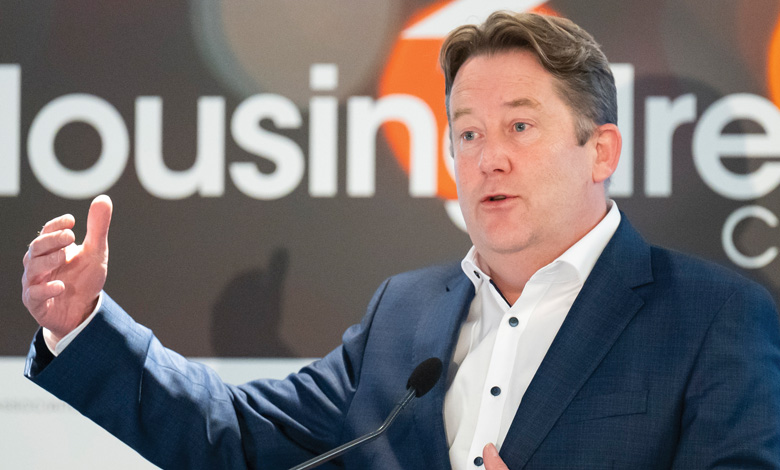Minister Darragh O’Brien TD: ‘Housing revival well underway’

A revival in housing is “well underway”, asserts Minister for Housing, Local Government and Heritage, Darragh O’Brien TD.
“The objective of Housing for All is that everybody should have access to sustainable, good quality housing to purchase or rent at an affordable price, built to a high standard, and in the right place,” O’Brien begins.
In 2023, a total of 32,695 new homes were delivered, representing an increase of 10 per cent on the 2022 figures and exceeding the targeted 29,000 by 13 per cent.
Highlighting that this represented “the highest number of new homes in this country in well over a decade”, the Minister turns his emphasis to commencements. “Momentum is growing with construction commenced on nearly 33,000 homes in 2023,” he says.
Affordability
Acknowledging affordability as a “challenge for many”, O’Brien maintains that Housing for All is having a tangible impact for those seeking to own a home. “Nearly 29,000 first time buyers received mortgage approval between January and November 2023,” he says, adding: “Many of these were supported by schemes such as First Home and Help to Buy.
“We have introduced the first affordable homes in a decade, underpinned by the Affordable Housing Act which was passed in 2021. Over €350 million has now been approved under the Affordable Housing Fund for the delivery of more than 4,400 affordable homes.”
“Housing for All is having a positive effect on thousands of the most vulnerable in this country.”
Minister for Housing, Local Government and Heritage, Darragh O’Brien TD
However, opposition housing spokespeople, such as Sinn Féin’s Eoin Ó Broin TD point to the Central Statistics Office’s (CSO) Property Price Index which, in February 2024, indicated that in 2023, house prices surpassed their Celtic Tiger peak and suggest that “reckless demand supply subsidies such as so-called Help to Buy and the controversial Shared Equity Loan Scheme are pushing up new house prices”.
Social housing
Heralding “the highest annual output of social homes in decades” alongside “the highest level of new-build social homes in over half a century”, the Housing Minister acknowledges the role of local authorities and approved housing bodies (AHBs).
“The almost doubling of new-build social homes is a testament to how Housing for All is having a positive effect on thousands of the most vulnerable in this country. A range of mechanisms are being employed to get families and individuals housed, particularly those at risk of homelessness, as quickly as possible,” he says.
While there has been a 16 per cent increase in delivery when compared with 2022, figures for 2023 indicate that – once again – the Government has missed its target for social housing.
In 2023, 11,939 social homes were delivered. This figure incorporates new build units (8,110), acquisitions (1,830), and leasing programmes (1,999). However, as per Housing for All, the projected new build social housing target for 2023 was 9,100, while the overall target was 11,820 social homes (excluding RAS and HAP).
Similarly, in 2022, a total of 10,263 social homes were delivered, of which 7,433 were new build, 951 were acquisitions, and 1,870 were leased. This total also fell below Housing for All’s target of 9,000 new build social units for 2022, and the overall target of 13,130 social units (excluding RAS and HAP).
Budget 2024
Turning to Budget 2024, O’Brien restates the additional support for “taxpayers who are paying rent on their principal private residence” via an increase in the Rent Tax Credit from €500 to €750.
More broadly, he emphasises the “record €5.1 billion in capital investment for housing is available” in 2024, comprising €2.6 billion in Exchequer funding, €1.5 billion in Housing Finance Agency Funding, and almost €1 billion in Land Development Agency funding. “The capital funding coupled with LDA and HFA investment is the highest ever in the history of the State,” he observes.

Sustainability
While cognisant that “supply is key”, the Minister also acknowledges that Housing for All roadmaps “a pathway to economic, societal, and environmental sustainability” in housing delivery.
Developed in alignment with the National Planning Framework and the Climate Action Plan, he suggests that Housing for All will “ensure that we achieve a more sustainable housing system that is fit for purpose and that will create long-term vibrant communities with the necessary supporting infrastructure”.
Planning
Describing the Planning and Development Bill 2023 as “the cornerstone of Irish planning for decades” once enacted, O’Brien indicates that it is intended to provide a new legislative framework for “proper spatial planning and sustainable development” in the State.
“It will provide a planning system which can deliver infrastructure, enhance natural assets and amenities and preserve, protect and improve the quality of the environment,” he says.
Existing stock
Renovating existing buildings which have fallen into vacancy or dereliction can produce between 50 and 75 per cent less carbon than constructing the same building from scratch.
Acknowledging the optimisation of the State’s existing housing stock as “a critical element of a sustainable housing policy”, the Minister refers to the Vacant Property Refurbishment Grant which, at the time of speaking, had received more than 6,000 applications and 3,000 approvals.
“In January [2023], I launched a €150 million fund to address long term vacancy and dereliction. The fund will support local authorities all across the country to breathe new life into their towns and cities and make them even better places in which to live, work, visit and invest,” he says.
Viability challenges
Meanwhile, in an effort to bridge the viability gap – where the cost of construction exceeds the market sale price of a housing unit – government has introduced three major programmes.
Amid inactivated planning permissions and the headwinds faced by the construction sector, the Secure Tenancy Affordable Rental (STAR) investment scheme is being offered to market stakeholders who will be required to deliver residential units for cost rental tenure. STAR, the Minister insists, “will ensure thousands of cost rental homes are delivered by 2027”.
Similarly, Project Tosaigh is a market engagement scheme aimed at accelerating affordable housing delivery on non-state lands where full planning permission has been granted but not activated by private developers in the face of low yields.
“The Project Tosaigh initiative has facilitated the LDA to partner with developers to ensure that delayed or otherwise unviable projects are completed, and the homes are made available to tenants and purchasers at affordable rates. The LDA will deliver 5,000 homes under the scheme by 2026,” the Minister explains, adding: “This is in addition to the agency’s pipeline on State-owned or acquired land.”
Introduced to address the viability gap in apartment delivery specifically, the Croí Cónaithe (Cities) scheme aims to deliver 5,000 owner-occupied apartments in the State’s urban centres.
“Five contracts have now been signed under the scheme,” O’Brien outlines, continuing: “bringing the number of apartments which will be delivered to almost 600 to date, including a 274-unit development in Cork [city], the largest private sector apartment development there for over a decade.”
The Housing Commission
Fulfilling a Programme for Government (PfG) commitment, government established The Housing Commission to take a long-term strategic view on the future of housing and to produce proposals on another PfG commitment, a “referendum on housing”.
Speaking with someone closely involved in The Housing Commission, eolas Magazine learned that the report had been expected to be published by mid-March 2024 – something which did not materialise – and that there would be an unspecified “unexpected twist”.
It is anticipated that the headline housing average annual delivery target will increase significantly from 33,000 to between 50,000 and 62,000 per year.
The Housing Commission submitted its report on proposed constitutional change to government in late 2023, followed by a minority report in early 2024.
“It is clear from their analysis that there are complex matters to be considered and I am carefully examining the report and recommendations,” the Housing Minister remarks.
Conclusion
Suggesting that Housing for All is “living up to its name”, O’Brien insists that the Government is meeting the housing crisis “head on” and “making every effort to accelerate delivery” while working towards a to establishment of a sustainable housing system in the long term. “The housing revival is well underway,” he concludes.





